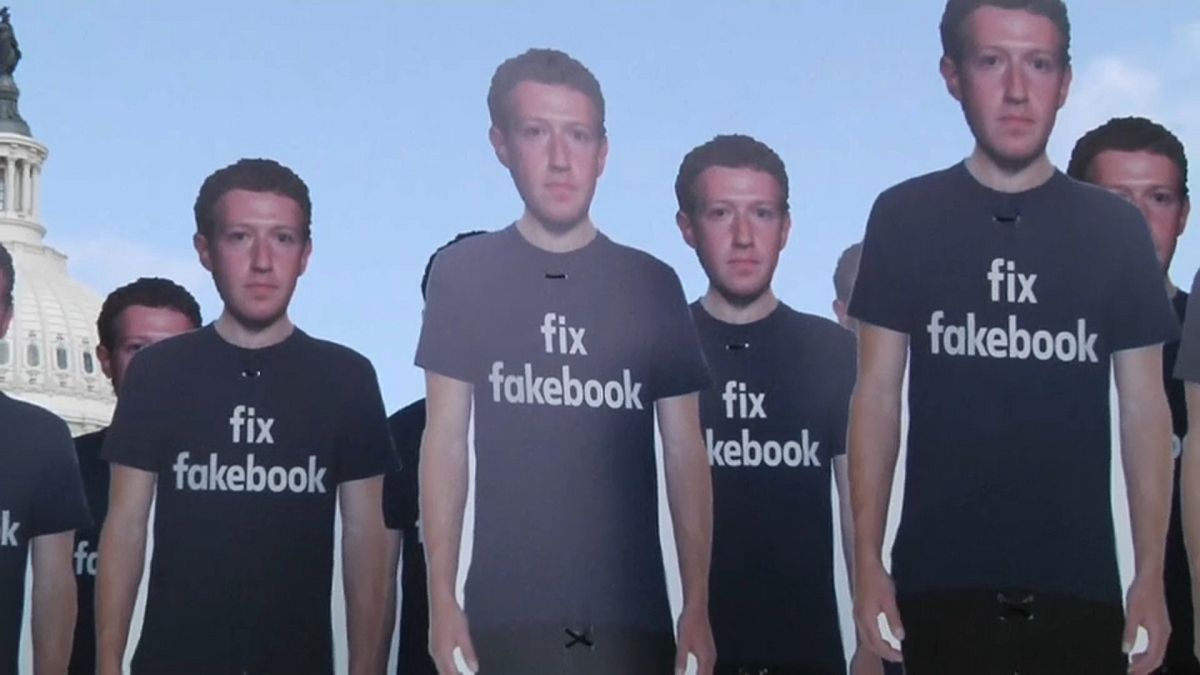The week in Europe with Stefan Grobe
Chatting with the French president on a sunny terrace of the Elysée Palace was something of a respite for Facebook CEO Mark Zuckerberg after a hectic day in Brussels where he had faced criticism and protests.
Emmanuel Macron wants to make France a start-up nation, a hot destination for technology investment in Europe.
Yet he told Zuckerberg that, yes, innovation is great but that it needs to come with tougher regulations.
Euronews’ Stefan Grobe in Brussels looks at this and more in the latest State of the Union..
ZUCKERBERG’S TRICKY VISIT
Macron likes to paint himself as a champion of France’s plugged-in youth and has talked about transforming his country into a world leader in artificial intelligence and “deep-tech”.
He is also spearheading efforts in Europe to have digital companies pay more taxes and wants tech giants like Facebook to get tougher on data protection and “fake news”.
To Zuckerberg, that couldn’t have sounded very different from what he heard in Brussels this week – and what he heard in Washington last month.
The difference is that while Zuckerberg was grilled before Congressional committees, he had an easy time before the European Parliament. Many European politicians were later frustrated that a flawed format let him
dodge the tough questions.
Zuckerberg was all smiles at a photo-op with European Parliament President Antonio Tajani. But Tajani looked like he had just met with Syria’s President Assad…He was stiff, and didn’t say a single word.
Zuckerberg largely repeated the same lines he has been using ad nauseam:
Facebook is very sorry, it is taking a broader view of its responsibilities, it’s investing heavily in safety and security, and so on and so forth.
He must have wondered “Have I come all the way to Europe for this?” Well, he still had Paris.
The reactions from Brussels were not long in coming.
ITALY STEPS INTO THE UNKNOWN
How about some news from Italy now? After 80 days of talks, the populist parties that won the largest share of seats in the election two months ago finally got the go-ahead to form a government.
The parties’ consensus pick for prime minister is Giuseppe Conte, a little-known lawyer with no government experience.
His first day on the job saw his security detail having to wait a bit until he was ready, only to see him jump in a waiting taxi… At least it was an Italian car.
Conte’s debut on the national stage was not entirely smooth. Apparent embellishments on his resumé set off a debate about whether he should serve at all.
But this is all academic. Conte will lead Italy’s 66th post-war government. So on average there is a new government every 11 months.
Those numbers should calm down all those who fear doomsday scenarios about a populist government in Italy blowing up the euro zone.
One of Conte’s future European colleagues is Angela Merkel of Germany, now in her 13th year in office.
This week she was in China to hatch plans to defend the Iran nuclear deal, abandoned by Donald Trump. Germany and China are two exporting nations that run large trade surpluses with the United States.
Both have found themselves in Trump’s firing line and are now scrambling to preserve what remains of the multilateral world order – the one that made both countries prosperous. On various fronts, Trump has driven
Germany and Europe to work more closely with China – against possible sanctions by the United States.
This is something that we all need to get used to.
For Europe, it also means revisiting its foreign relations strategies and the way it conducts political business. At the European Business Summit in Brussels this week, rethinking Europe’s role in the world was a key
issue.
COMING UP IN EUROPE
And here is a look at what’s ahead in week 22:
On Monday, the EU Foreign Affairs Council comes together in Brussels. At the top of the agenda will be Iran and the nuclear deal.
Also on Monday, NATO Secretary General Jens Stoltenberg addresses the Parliamentary Assembly of the western alliance, which holds its spring session in Warsaw.
On Wednesday, Greece faces widespread disruption as a range of labor unions announce a 24-hour general strike. Activists say the action is being called in protest against austerity measures implemented by the
coalition government in Athens.
People in Greece were advised to confirm travel reservations, prepare for limited ferry services and avoid protests due to the potential of violence.
In Sweden this week, the parliament dealt with a very specific form of violence, rape. A large majority of lawmakers passed a law requiring explicit consent – verbal or physical – from participants before they engage in
a sexual act.
In other words: yes means yes. Passivity cannot be read as consent. Sex must be voluntary – if it’s not, it’s rape.
Sweden is now the 10th country in Western Europe to think so. Some have argued that the law will be difficult to enforce.
But lawmakers hope the legislation will help change attitudes and curtail sexual assaults – which have tripled since 2012 in Sweden.
